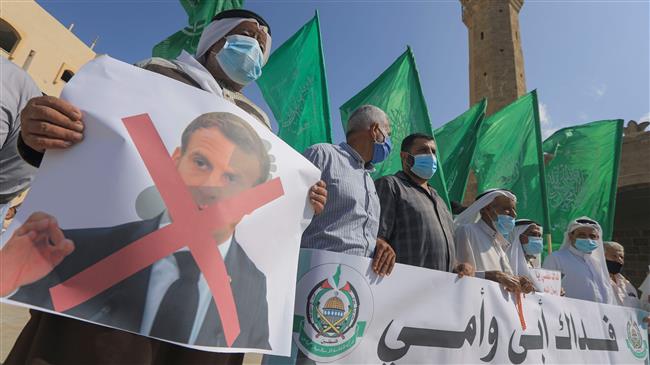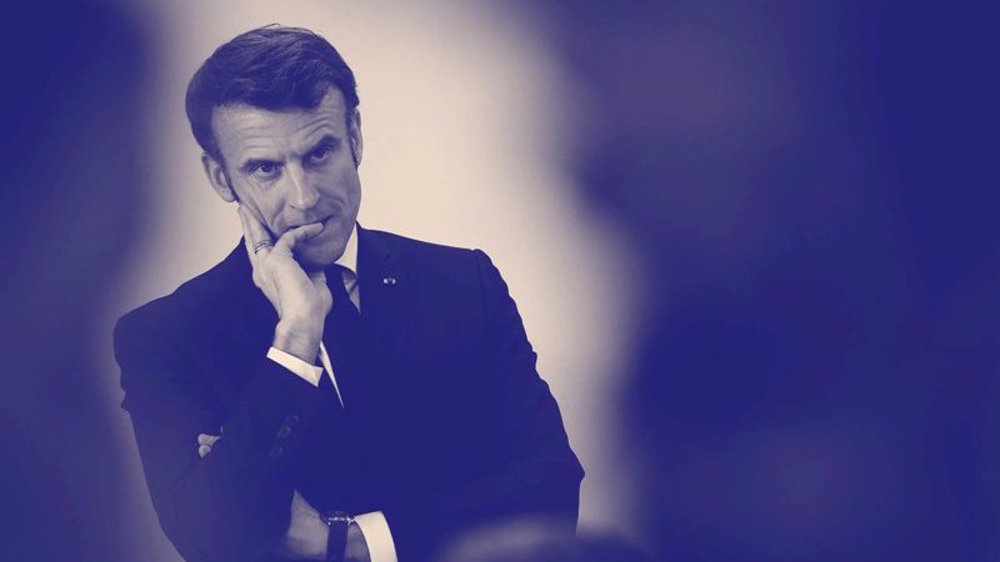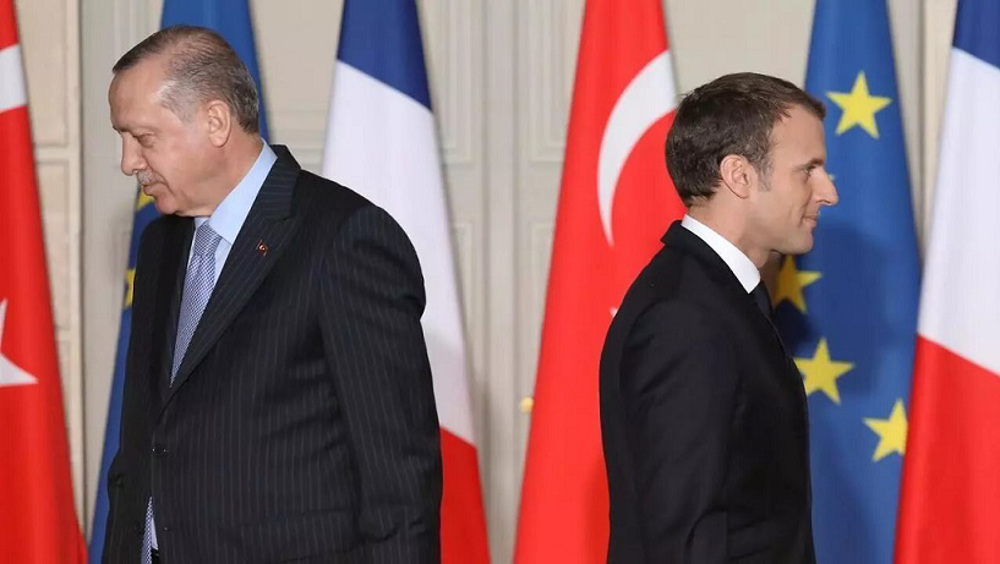Insisting on insult, Macron opens floodgates for Muslim backlash
Numerous Muslim states and peoples have denounced French President Emanuel Macron’s persisting support for blasphemy in his country against Prophet Muhammad (PBUH).
“We will not give in, ever,” Macron tweeted on Sunday. The tweet served to back up his earlier support for a French teacher’s displaying of cartoons insulting of the Prophet of Islam in his class under the pretext of “freedom of speech.”
We will not give in, ever.
— Emmanuel Macron (@EmmanuelMacron) October 25, 2020
We respect all differences in a spirit of peace. We do not accept hate speech and defend reasonable debate. We will always be on the side of human dignity and universal values.
“France will never renounce caricatures,” Macron had declared on Wednesday, defending the teacher for “promoting freedom.”
The teacher Samuel Paty was murdered by an 18-year-old Chechen assailant. Commenting on the attack, Macron described Islam as a religion “in crisis” worldwide, trying to suggest that the assailant had been motivated to kill the teacher by the faith rather than radicalism.
The comments have raised controversy and provoked a wave of criticism from the Muslim world.
On Sunday, the Persian Gulf Cooperation Council (GCC) described Macron’s position as “irresponsible,” and said it was aimed at spreading a culture of hatred among peoples.
Turkish President Recep Tayyip Erdogan, who had called on Macron to have his mental status examined for defending blasphemy, repeated the call on Sunday. Macron "is a case and therefore he really needs to have [mental] checks," Erdogan said.
In a statement, Kuwait’s Foreign Ministry warned that attempts at linking Islam to terrorism “represents a falsification of reality, insults the teachings of Islam, and offends the feelings of Muslims around the world.”
Pakistani Prime Minister Imran Khan also hit out at Macron for "attacking Islam clearly without having any understanding of it."
He urged the French president to rather address the marginalization and polarization that is being committed against minorities in France that “inevitably leads to radicalization."
The Pakistani head of state also wrote to Facebook, asking the social media network to clamp down on Islamophobic content in the same way that it purges content aimed at skewing or denying the Holocaust.
He warned about a “growing” trend of Islamophobia throughout the platform among elsewhere, pleading with Facebook CEO Mark Zuckerberg, “I would ask you to place a similar ban on Islamophobia and hate against Islam for Facebook that you have put in place for the Holocaust.”
“One cannot send a message that while hate messages against some are unacceptable, these are acceptable against others,” Khan said, adding that this attitude was “reflective of prejudice and bias….”
Pakistan also summoned France's ambassador and notified him about Islamabad’s protest at “systematic Islamophobic campaign under the garb of freedom of expression."
Jordan's Islamic Affairs Minister Mohammed al-Khalayleh said "insulting" prophets is "not an issue of personal freedom but a crime…," and Morocco’s Ministry of Foreign Affairs said continuing publication of such “offensive” is an act of provocation.
Hamas and Hezbollah, respectively Palestinian and Lebanese resistance movements, have also condemned Macron’s position.
Hamas spokesman Sami Abu Zuhri said on Saturday that publishing the cartoons was “provocative to the feelings of the Islamic nation and an aggression on its religion and beliefs,” while Hezbollah said blasphemy did not categorize as “freedom of speech.”
Protests were, meanwhile, reported in the Gaza Strip, Syria, and Libya as well as elsewhere throughout the Muslim world.
Boycott spree
Many Muslim companies and associations, meanwhile, have stopped handling or serving French items in protest.
These have included the Al-Naeem Cooperative Society and the Dahiyat al-Thuhr association in Kuwait as well as the Wajbah Dairy firm and Al Meera Consumer Goods Company in Qatar. The Qatar University has also postponed a French cultural week.
Hashtags such as the #BoycottFrenchProducts in English and the Arabic #ExceptGodsMessenger trended across many countries, including Kuwait, Qatar, Palestine, Egypt, Algeria, Jordan, Saudi Arabia, and Turkey.
The French Foreign Ministry, however, reacted angrily to the bans.
"The calls for a boycott are groundless and must be stopped immediately, like all attacks against our country committed by a radical minority," it alleged, trying to associate the protests with “radicalism.”
VIDEO | Hind Rajab Foundation names Israeli war criminals vacationing after Gaza genocide
VIDEO | Australians rally for Gaza ahead of Christmas festivities
VIDEO | Attacks on Sana'a
Iran reports further drop in annual inflation rate in December
Israel indicts two settlers over suspected spying for Hezbollah
Iran: US airstrikes on Yemen war crimes, violation of international law
Yemeni armed forces down F-18 fighter jet, repel US-UK attack: Spokesman
Iran warns against US-Israeli plot to weaken Muslims, dominate region















 This makes it easy to access the Press TV website
This makes it easy to access the Press TV website